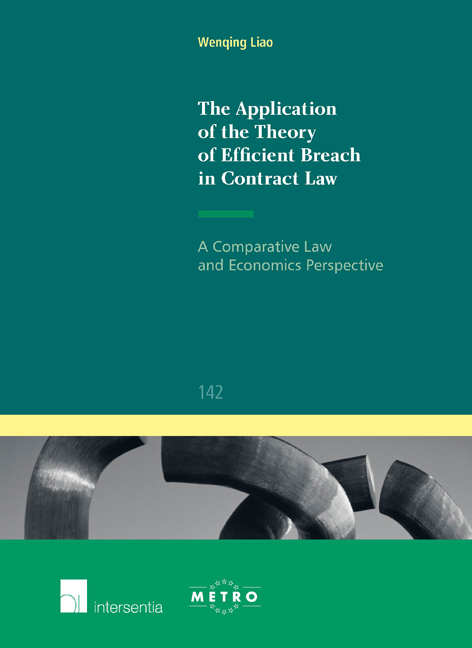 The Application of the Theory of Efficient Breach in Contract Law
The Application of the Theory of Efficient Breach in Contract Law Published online by Cambridge University Press: 12 December 2017
Background
Against a background where commercial trading is growing and becoming more complex in modern society, private parties are appealing for more flexibility and freedom in taking commercial decisions, rather than strictly abiding by the documents they have signed. Correspondingly, the traditional study of contract law, which offers a fundamental legal structure for trade, has received more theoretical debate. The traditional legal idea that breach of contract is wrong and should be avoided has been challenged. Law and Economics, with its efficient breach theory, obviously provides one of the strongest voices and provides a utilitarian approach to explain contract and promissory obligations, which have been influenced greatly by the traditional notion of pacta sunt servanda and the moralistic nature of obligations. In 1897, Judge Oliver Wendell Holmes wrote in his well-known book “The Path of the Law’ that: “The duty to keep a contract at common law means a prediction that you must pay damages if you do not keep it, and nothing else.” Afterwards, this illustration of contract became a strong support for the theory of efficient breach, which is assumed to have been clarified first in Birmingham in 1970 and received its name by Goetz & Scott 1977.
Structured on the contract's functions of optimally allocating goods and factors of production as well as enhancing social welfare, the theory of efficient breach is stipulated to count all gains and losses in monetary value in the period between the birth and death of a contract. In the early stage, after the theory was born, it was used mainly to describe a desirable kind of breach, where the promisor's gain from breach, after paying expectation damages, exceeds his profit from performance. This sort of breach was assumed to be a movement toward economic efficiency and consistent with the contract parties’ economic preference. Scholarly efforts were made to justify this theory from an economic perspective. Before that, there was Coase's statement that “once the costs of carrying out market transactions are taken into account it is clear that such a rearrangement of rights will only be undertaken when the increase in the value of production consequent upon the rearrangement is greater than the costs which would be involved in bringing it about.” Birmingham reached a similar conclusion when illustrating the case where an employee gets a better job.
To save this book to your Kindle, first ensure [email protected] is added to your Approved Personal Document E-mail List under your Personal Document Settings on the Manage Your Content and Devices page of your Amazon account. Then enter the ‘name’ part of your Kindle email address below. Find out more about saving to your Kindle.
Note you can select to save to either the @free.kindle.com or @kindle.com variations. ‘@free.kindle.com’ emails are free but can only be saved to your device when it is connected to wi-fi. ‘@kindle.com’ emails can be delivered even when you are not connected to wi-fi, but note that service fees apply.
Find out more about the Kindle Personal Document Service.
To save content items to your account, please confirm that you agree to abide by our usage policies. If this is the first time you use this feature, you will be asked to authorise Cambridge Core to connect with your account. Find out more about saving content to Dropbox.
To save content items to your account, please confirm that you agree to abide by our usage policies. If this is the first time you use this feature, you will be asked to authorise Cambridge Core to connect with your account. Find out more about saving content to Google Drive.